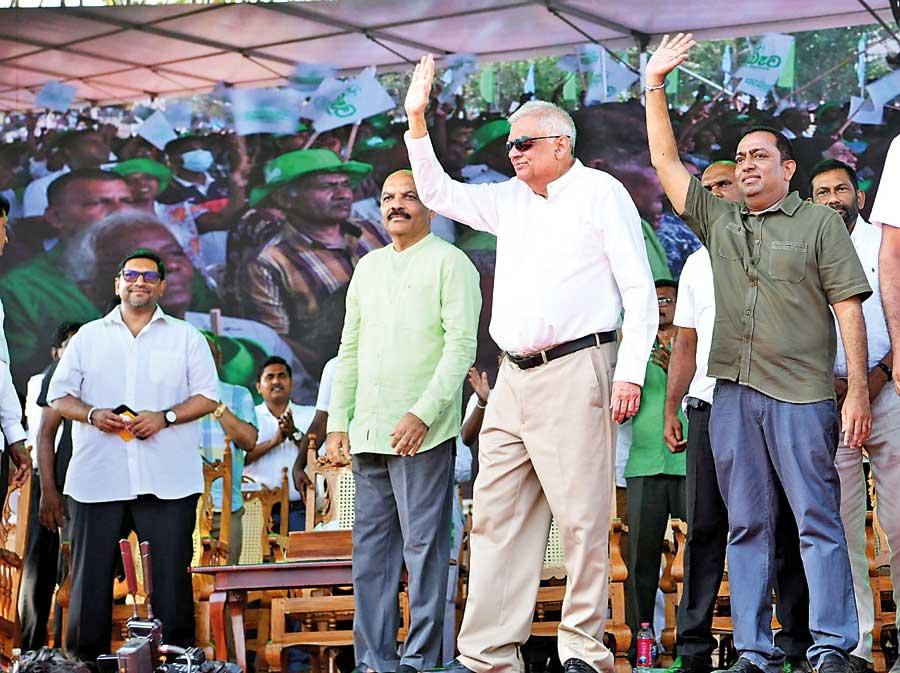Presidential polls: Strategic alliances, political maneuvering amid uncertainty
Posted on June 28th, 2024
Courtesy The Daily Mirror

President Ranil Wickremesinghe was declared as the common candidate of the United National Party led front
As the presidential elections draw near, uncertainty still looms large over the possible contenders except for two prospective candidates- Anura Kumara Dissanayake of National People’s Power (NPP) and Sajith Premadasa of Samagi Jana Balawegaya who have already announced their candidature.
Power (NPP) and Sajith Premadasa of Samagi Jana Balawegaya who have already announced their candidature.
What is currently happening is nothing but political strategising, maneuvering and groundwork preparation for the elections.President Ranil Wickremesinghe has not yet declared whether he will be a candidate or not. Still, all indications from his political camp point to his prospect of contesting as a common candidate.
The concept of a ‘common candidate’ in Sri Lankan politics refers to a political strategy where a candidate runs for office without being directly affiliated with a political party. Instead, the candidate is supported by a coalition of political groups and individuals who come together despite their different political ideologies. The goal is to present a united front, often to challenge a dominant political party or figure, and to appeal to a broader spectrum of the electorate by emphasising shared goals and values over party loyalty.
Broader consensus
This approach can be particularly effective in a situation where no single party has overwhelming support, allowing the possibility of building a broader consensus and attracting voters who might not align strictly with one party’s platform.
Political strategists who work on the President’s election campaign are currently in the process of cobbling together an alliance. Buoyed by the success story of debt restructuring, the President will formally announce his electoral prospects soon. Nevertheless, in the formation of his alliance, he is currently faced with challenges in reconciling competing interests.
Already, he has secured the support of two Tamil parties – Tamil Makkal Viduthalai Pulikal (TMVP) and Ceylon Workers’ Congress (CWC). A section of the ruling Sri Lanka Podujana Peramuna (SLPP) has also thrown its weight behind him. Also, the Sri Lanka Freedom Party (SLFP) led by Nimal Siripala de Silva and directed behind the scenes by former President Chandrika Bandaranaike Kumaratunga is also on board with him. However, his camp is now confronted with the challenge of striking a deal with the SLPP organised by its founder Basil Rajapaksa and led by former President Mahinda Rajapaksa. In the aftermath of the Aragalaya, the SLPP and the President joined forces to form the current government. It was a political marriage of convenience warranted under the circumstances rather than a reconciliation of political ideologies and interests.
At a recent meeting, Basil Rajapaksa lashed out at those who advocated the exclusion of the Rajapaksas in the formation of an alliance with the SLPP. The call for the exclusion of Rajapaksas appears to have created a tiff with the President’s camp.
The SLPP has now begun working to field its candidate instead of supporting the President at the election. This is a new development which will further exacerbate political uncertainties involving the upcoming presidential elections.
Double-edged sword
The prospect of the Rajapaksas participating in the election is a double-edged sword. While their involvement could secure a strong base vote, it may also alienate Tamil and Muslim voters, crucial for any candidate’s success. The ability to attract minority parties and their supporters is pivotal. These groups can significantly influence the outcome, particularly in a fragmented electoral scenario.
Political strategists are keenly aware of the delicate balance required. The President’s camp must weigh the potential gains from minority party support against the risks of losing the SLPP base. The SLPP’s consideration of an independent candidate might be a tactic to negotiate better terms with Wickremesinghe’s alliance.
The influence of minority parties can be significant in a closely contested election. The ability of these parties to mobilise votes in their respective communities can tip the scales in certain electoral districts. Still, the SLPP too has a base that can matter a lot in a closely contested election.
Ahead of the election, it is apparent that all the main parties court Tamil and Muslim constituents. The President, Premadasa and NPP leader Dissanayake toured the North and engaged with party representatives there. Power sharing, the implementation of the 13th Amendment, the possible re-merger of the Northern and Eastern provinces and addressing human rights issues linked to wartime were among the main issues that used to swing Tamil votes in favour of any candidate in the past. The President and Premadasa are clear on the implementation of the 13th Amendment which is anyway part of the Constitution. However, Dissanayake is not clear on any of these issues making it difficult for him to convince Tamil constituents.
Political uncertainty
Amid such political uncertainty, Indian External Affairs Minister Dr. S. Jaishankar also visited Sri Lanka- his first in the region after assuming office for the second time- at a time when the country’s political scene is replete with a flurry of activities in view of the presidential elections.
In the wake of the economic crisis and the subsequent declaration of Sri Lanka’s bankruptcy in April, 2022, Indo-Lanka ties reached an all-time high. The extension of US $ 4 billion financial assistance and the launch of connectivity projects are the main pillars of bilateral ties today. His visit is mainly for the understanding of Sri Lankan politics ahead of the vital elections and to ensure that the vital projects, which are now at various stages of implementation, are carried out unhindered by any incoming government.
The upcoming presidential election is marked by strategic alliances, the balancing of minority and majority interests, and significant external influences. The interplay of these factors will shape the electoral strategies and potentially determine the next president.